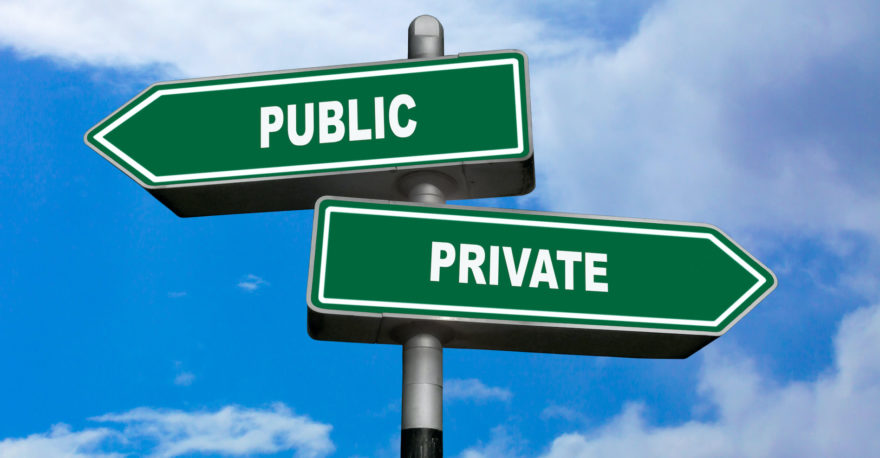- Blog
- > Private School Admissions
Private vs. Public High Schools: Which Option Is Better for You?
- Dr. Rachel Rubin
- | February 3, 2020

Choosing where to educate your children is among the most important decisions a parent has to make. For many families, the choice between attending a private school and a public school arises as part of this conversation. It’s clear that both types of schools have advantages and disadvantages, so how can you decide which option is better for you?
The truth is that the choice to attend a private versus a public school depends more on the individual student and family than any other factor. Therefore, the most important thing you can do as you make this decision is think carefully about your child’s goals and needs, so you can best evaluate which schooling option is right for him or her.
In the end, the best thing for your child in both the near- and long-term is finding a place where he or she will thrive both academically and socially. Here’s how to think about what the major differences between public and private schools mean for your family:
School Size
One of the biggest differences between public and private schools, particularly high schools, is the size of the student body. In general, public schools tend to be much larger than private schools, which affects various aspects of students’ experiences.
Academically, a more expansive student body means increased class sizes and higher student-to-faculty ratios, which some students enjoy but others find challenging. A larger student body can also mean more elective classes, but only if there are enough teachers to offer them. Public schools’ diverse student bodies also tend to mean leveled classes, which is good for some students but not others.
Socially, some students thrive in a large, heterogeneous environment, exploring new things and meeting new people. Others feel overwhelmed and lost in such settings and don’t know how to get the help they need or how to make friends. As you consider the choice between private and public, it’s crucial to understand which sort of student your child is.
Academics
Of course, when thinking about your child’s schooling, the quality of the education is probably at the top of your concerns already. To compare the academics at public and private schools effectively, you’ll want to examine both the big picture and the details.
For the big picture, many private schools tout particular educational philosophies, whether it’s a unique teaching approach or a broader philosophy of education. As you research, you may find a program that feels like the exact right fit for your child’s learning goals and interests. Or you might find that your local public school meets your academic expectations just as well.
For the details, get into the course guides! Do the schools offer Advanced Placement courses or suitable replacements? Do any offer research opportunities or chances to take classes at a local university? What about interesting elective courses? Once you have a good sense of what your child’s daily course schedule will look like, you can make a more informed decision.
Extracurricular Activities
In thinking about a new school, it’s important that students have opportunities to learn and socialize outside the classroom as well as in it. As you’re choosing between schools, take a look at the club directories to see what kinds of extracurricular activities are offered.
As you review the directories, think about your child’s interests. For kids who love science, are there competitive science and math teams? What about a robotics club? For students who prefer the humanities, what kinds of student publications exist? Can anyone join these organizations, or do they need to take certain courses first? What about clubs focused on community service?
In general, it tends to be easier for students to start clubs at public schools, which means a wider array of clubs than at private schools. As such, it’s often easier for public school students to attain extracurricular leadership roles. At the same time, private school clubs tend to have more structure and oversight, which might be a better fit for your child’s personality.
Location
For most families, the public option is also the closest option. Some may also have private options nearby, while others may be looking further afield. The location of the right private school is something to take seriously, for a host of factors.
Of course, the biggest decision for private school is about boarding versus day. We’ve written on choosing the right private school elsewhere, but if you’re still at the stage of deciding between public and private, it’s worth considering whether your child would enjoy boarding school at all. If not, are there suitable day schools in your immediate area?
If your child does prefer to be a day student, think carefully about the commute time. More time in the car means less time for homework and extracurricular activities. Staying local by sending your child to public school can make life easier; with less travel time, students can more easily get together with their classmates and friends after school and on weekends.
Spark Admissions has the highest private high school and college admissions success rate in the country
Schedule A Free Consultation with an Admissions Expert
Schedule NowStudent Support
Another key difference between private and public schools is the gap in administrative support. Private schools tend to have many more people and programs to support students, families, and teachers; public schools generally provide less student support.
That isn’t to say that strong public schools just let students flounder; teachers and guidance counselors can absolutely provide academic and psychological support to students who are struggling with some aspect of their schooling experience. However, they generally don’t offer the same level of individual support that private schools do.
Particularly in high school, some students benefit a lot from learning to advocate for themselves and figuring out how to find and use available resources, and therefore do well in public school. Others are not quite ready for that level of independence and will do better in a more supportive academic environment.
College Admissions
One of the most common questions we hear is: which will be better for getting into a good college, private or public school? The answer is: it depends on the student. To get into selective colleges and universities, a student needs to succeed both in and outside the classroom.
Colleges don’t prefer private to public high schools, or the reverse; they want to see strong students who are leaders, collaborators, and curious thinkers. If your child will succeed in a place with a diverse population, ample extracurricular opportunities, and rigorously leveled classes, then public school is the right choice. If they need more consistent support, opt for private school.
College admissions is also a reason to think about the academics and extracurricular activities of your school options. Where will your student be able to develop his or her academic interests? Where can he or she take Advanced Placement courses? Where can he or she obtain leadership roles? Colleges care more about what a student does than where he or she does it.
Cost
Finally, of course, there’s the matter of cost. Public school isn’t entirely free, of course; there may be fees for activities like music or sports, which could be included in the student fees at a private school. Nevertheless, the overall cost differential is likely to be substantial, and some costs, like those for summer programs, will occur in either case.
Decisions about money are unique to every family; we all value different things, or at least weight them differently. Answering the question of whether private school is worth the money is something all parents must decide for themselves, based on all available information about their child, their goals, their values, and their financial circumstances.
Final Thoughts
Ultimately, to choose between private and public high school requires you to decide whether you want an environment that caters to a particular kind of student and is driven by a particular philosophy or an environment in which students have ample opportunity to meet new people and learn new things but need to learn initiative and self-confidence in order to do so.
If you look, you’ll find passionate defenders of each approach and plenty of success stories from both types of schools. In the end, the answer will depend on your child and your family and how you weigh the importance of everything we’ve said here. Having a vision for your child’s education, starting now and extending into college and beyond, will help you make the right choice.
If you decide to apply to private school, check out our resources on the application process, or give us a call. Our team of expert college admissions consultants would be happy to help you think through this decision!


